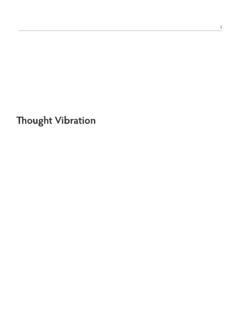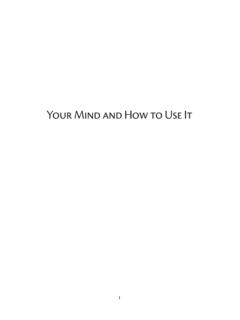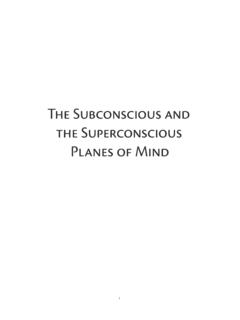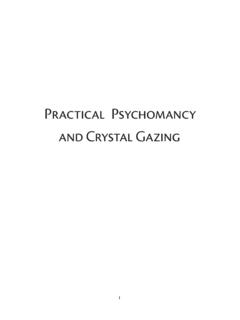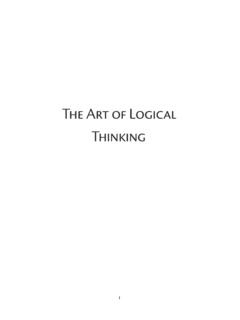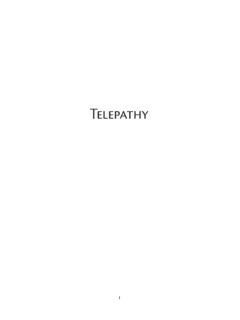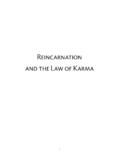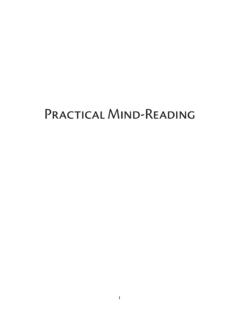Transcription of Memory: How to Develop, Train and Use It
1 IMemoryMemoryiiWritingsThought Force in Business and Everyday LifeThe Law of the New ThoughtNuggets of the New ThoughtMemory Culture: The Science of Observing, Remembering and RecallingDynamic Thought or The Law of Vibrant EnergyThought Vibration or the Law of Attraction in the Thought WorldPractical Mind ReadingPractical Psychomancy and Crystal GazingThe Mind Building of a ChildThe Secret of Mental MagicMental FascinationSelf Healing by Thought ForceMind Power: The Law of Dynamic MentationPractical Mental InfluenceReincarnation and the Law of KarmaThe Inner ConsciousnessThe Secret of SuccessMemory: How to develop , Train and Use ItSubconscious and the Superconscious Planes of MindSuggestion and Auto SuggestionThe Art of ExpressionThe Art of Logical ThinkingThe New Psychology: Its Message, Principles and PracticeThe WillThought CultureHuman Nature: Its Inner States and Outer FormsMind and Body or Mental States and Physical ConditionsTelepathy: Its Theory, Facts and ProofThe Crucible of Modern ThoughtThe Psychology of SalesmanshipThe Psychology of SuccessScientific ParenthoodThe Message of the New ThoughtYour Mind and How to Use ItThe Mastery of BeingMind Power: The Secret of Mental MagicThe New Psychology of HealingNew Thought: Its History and Principles iiiMemoryHow to develop , Train and Use It1909 William Walker Atkinson1862 1932 YOGeBooks: Hollister, MO2013:09:06:17:04:43 MemoryivCopyrightYOGeBooks by Roger L.
2 Cole, Hollister, MO 65672 2010 YOGeBooks by Roger L. ColeAll rights reserved. Electronic edition published 2010isbn: 978 1 61183 084 2 (pdf)isbn: 978 1 61183 085 9 (epub) I .. memory : Its ImportanceChapter II ..Cultivation Of The MemoryChapter III ..Celebrated Cases of MemoryChapter IV .. memory SystemsChapter V ..The Subconscious Record FileChapter VI ..AttentionChapter VII ..AssociationChapter VIII ..Phases of MemoryChapter IX ..Training the EyeChapter X ..Training the EarChapter XI ..How to Remember NamesChapter XII ..How to Remember FacesChapter XIII ..How to Remember PlacesChapter XIV ..How to Remember NumbersChapter XV ..How to Remember MusicChapter to Remember OccurrencesChapter XVII ..How to Remember FactsChapter XVIII ..How to Remember Words, EtcChapter XIX ..How to Remember Books, Plays, Tales, EtcChapter XX ..General InstructionsMemoryvi 1 MemoryMemory2 memory : Its Importance3 Chapter IMemory: Its ImportanceIt needs very little argument to convince the average thinking person of the great importance of memory , although even then very few begin to realize just how important is the function of the mind that has to do with the retention of mental impressions.
3 The first thought of the average person when he is asked to consider the importance of memory , is its use in the affairs of every day life, along developed and cultivated lines, as contrasted with the lesser degrees of its development. In short, one generally thinks of memory in its phase of a good memory as contrasted with the opposite phase of a poor memory . But there is a much broader and fuller meaning of the term than that of even this important is true that the success of the individual in his every day business, profession, trade or other occupation depends very materially upon the possession of a good memory . His value in any walk in life depends to a great extent upon the degree of memory he may have developed. His memory of faces, names, facts, events, circumstances and other things concerning his every day work is the measure of his ability to accomplish his task.
4 And in the social intercourse of men and women, the possession of a retentive memory , well stocked with available Memory4facts, renders its possessor a desirable member of society. And in the higher activities of thought, the memory comes as an invaluable aid to the individual in marshalling the bits and sections of knowledge he may have acquired and passing them in review before his cognitive faculties thus does the soul review its mental possessions. As Alexander Smith has said: A man s real possession is his memory ; in nothing else is he rich; in nothing else is he poor. Richter has said: memory is the only paradise from which we cannot be driven away. Grant but memory to us, and we can lose nothing by death. Lactantius says: memory tempers prosperity, mitigates adversity, controls youth, and delights old age.
5 But even the above phases of memory represent but a small segment of its complete circle. memory is more than a good memory it is the means whereby we perform the largest share of our mental work. As Bacon has said: All knowledge is but remembrance. And Emerson: memory is a primary and fundamental faculty, without which none other can work: the cement, the bitumen, the matrix in which the other faculties are embedded. Without it all life and thought were an unrelated succession. And Burke: There is no faculty of the mind which can bring its energy into effect unless the memory be stored with ideas for it to look upon. And Basile: memory is the cabinet of imagination, the treasury of reason, the registry of conscience, and the council chamber of thought. Kant pronounced memory to be the most wonderful of the faculties.
6 Kay, one of the best authorities on the subject has said, regarding it: Unless the mind possessed the power of treasuring up and recalling its past experiences, no knowledge of any kind could be acquired. If every sensation, thought, or emotion passed entirely from the mind the moment it ceased to be present, then it would be as if it had not been; and it could not be recognized or named should it happen to return. Such an one would not only be without knowledge,without experience gathered from the past, but without purpose, memory : Its Importance5aim, or plan regarding the future, for these imply knowledge and require memory . Even voluntary motion, or motion for a purpose, could have no existence without memory , for memory is involved in every purpose. Not only the learning of the scholar, but the inspiration of the poet, the genius of the painter, the heroism of the warrior, all depend upon memory .
7 Nay, even consciousness itself could have no existence without memory for every act of consciousness involves a change from a past state to a present, and did the past state vanish the moment it was past, there could be no consciousness of change. memory , therefore, may be said to be involved in all conscious existence a property of every conscious being!In the building of character and individuality, the memory plays an important part, for upon the strength of the impressions received, and the firmness with which they are retained, depends the fibre of character and individuality. Our experiences are indeed the stepping stones to greater attainments, and at the same time our guides and protectors from danger. If the memory serves us well in this respect we are saved the pain of repeating the mistakes of the past, and may also profit by remembering and thus avoiding the mistakes of others.
8 As Beattie says: When memory is preternaturally defective, experience and knowledge will be deficient in proportion, and imprudent conduct and absurd opinion are the necessary consequence. Bain says: A character retaining a feeble hold of bitter experience, or genuine delight, and unable to revive afterwards the impression of the time is in reality the victim of an intellectual weakness under the guise of a moral weakness. To have constantly before us an estimate of the things that affect us, true to the reality, is one precious condition for having our will always stimulated with an accurate reference to our happiness. The thoroughly educated man, in this respect, is he that can carry with him at all times the exact estimate of what he has enjoyed or suffered from every object that has ever affected him, and in case of encounter can present to Memory6the enemy as strong a front as if he were under the genuine impression.
9 A full and accurate memory , for pleasure or for pain, is the intellectual basis both of prudence as regards self, and sympathy as regards others. So, we see that the cultivation of the memory is far more than the cultivation and development of a single mental faculty it is the cultivation and development of our entire mental being the development of our many persons the words memory , recollection, and remembrance, have the same meaning, but there is a great difference in the exact shade of meaning of each term. The student of this book should make the distinction between the terms, for by so doing he will be better able to grasp the various points of advice and instruction herein given. Let us examine these in his celebrated work, the Essay Concerning Human Understanding has clearly stated the difference between the meaning of these several terms.
10 He says: memory is the power to revive again in our minds those ideas which after imprinting, have disappeared, or have been laid aside out of sight when an idea again recurs without the operation of the like object on the external sensory, it is remembrance; if it be sought after by the mind, and with pain and endeavor found, and brought again into view, it is recollection. Fuller says, commenting on this: memory is the power of reproducing in the mind former impressions, or percepts. Remembrance and Recollection are the exercise of that power, the former being involuntary or spontaneous, the latter volitional. We remember because we cannot help it but we recollect only through positive effort. The act of remembering, taken by itself, is involuntary. In other words, when the mind remembers without having tried to remember, it acts spontaneously.

